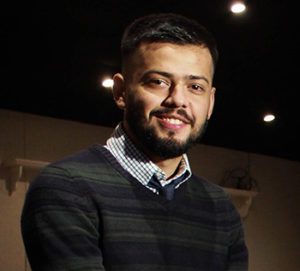EDINBURG—As a first-generation college student, Alejandra has faced her share of challenges.
Because her family has no experience with college life, they cannot advise her in some areas.
Alejandra is reluctant to reveal her last name because, although she entered the United States legally, she overstayed her visa and is in the process of trying to resolve immigration issues.
As a first-generation student from another culture, finding the support she needs at the University of Texas Rio Grande Valley can be difficult.
“I have felt clueless in college,” she said. “I had to learn how to speak up and defend myself.”
However, she found welcome support at the UT Rio Grande Valley Baptist Student Ministry. Alejandra, a studio art major, said BSM made a positive and profound impact on her life.
Found support and guidance
Like Alejandra, Daniel Ortiz arrived in the United States from Mexico along with his family several years ago.

His parents wanted him to have better opportunities, and they thought education would help provide that.
As soon as Ortiz began college, he faced decisions he was not prepared to make.
Sign up for our weekly edition and get all our headlines in your inbox on Thursdays
“I made mistakes I probably would not have made if I was not a first-generation college student,” said Ortiz, a clinical lab science major who hopes attend medical school after college to become a missionary doctor.
At the BSM, Ortiz gets a chance to find support and guidance.
“I think the church should be more like the BSM, where you have day-to-day interactions,” Ortiz said.
The future college population
Alejandra and Daniel are not atypical of the student population at UT Rio Grande Valley, said Robert Rueda, BSM director at the school. In fact, he added, they might be examples of what many college students may look like soon throughout Texas and around the rest of the nation.
Hispanic students make up 89 percent of the students enrolled in 2017 at UT Rio Grande Valley, which has a main campus in Edinburg and several other sites elsewhere in South Texas.
Of first-generation students enrolled at the school last year, more than 94 percent were Hispanic.
Latinos are the largest and fastest-growing minority group in the nation.
So, it is not surprising to see the number of Hispanics enrolling in college across the country rise to 47 percent, equal to the Anglo enrollment rate.
Model for other campus ministries
For that reason, Rueda’s work at the UT Rio Grande Valley BSM could provide a guide for other BSMs to consider in the future.
“My goal is not only to teach students about Jesus, but to also show them a model of growth in their life,” Rueda said.
Many of the students with whom Rueda works are the first members of their families to attend college. In many cases, the students’ parents immigrated to the United States specifically so their children would have better educational opportunities.
For many, graduating from high school represents a great accomplishment, but college is an unknown place with challenges they are not ready to tackle alone.
Although the students’ parents want their children to receive an education, a 2006 study by University of Michigan professor Vasti Torres reveals a clash between cultural expectations and the parents’ understanding of college life.
Finish college
BSM can help “provide the support the students need to finish college,” Rueda said.
“We are called to be transformed and to help people be transformed,” he added.
The Post Secondary National Policy Institute reported first-generation college students have lower rates of college readiness, and are therefore more likely to fail in college and not complete the degrees they plan to pursue.
For students whose parents went to college, 64 percent will finish college in a six years, while only 50 percent of first-generation college students will finish their degree in that time.
Transforming the region
So, helping first-generation Hispanic students finish college is an investment in the future not only of those students, but also of their families and their communities, Rueda said.
“Education in the Rio Grande Valley is key to transforming the Rio Grande Valley,” he said.
Rueda sees it as part of his role to help students know more about their options. Although it is not part of his job description, he has learned about grants and loans available for students to pay for college.
“Our goal here is to affirm every student,” Rueda said. “They have to deal with so many issues, but we know tomorrow they will be young professionals committed to the church.”
The median household income for first-generation college students is $37,565, Forbes reported. That represents a significant difference from the $99,635 annual household income of college students have whose parents earned a degree.
The challenges first-generation Hispanic college students face do not have to be seen only as obstacles, Rueda insisted. Instead, they demonstrate how resilient these students are, and how hard they work to accomplish their goals, he said.
“They work hard already, and will continue to work hard when they go somewhere else,” he said.
Success story
The opportunities to provide support to first-generation college students has given Rueda an opportunity to build friendships and see how graduates use their preparation in college to serve others.

He points to Jesus Jose Mendoza, a campus missionary intern at the UT Rio Grande Valley BSM, as a recent example.
Mendoza’s parents were migrant workers. Depending on the season, his parents would come and go from Texas and Oregon. Mendoza and his two siblings went along with them.
“My dad saw his and my mom’s life and wanted something different from us,” Mendoza said. “‘Struggling’ was a word they used a lot.”
Survival made education difficult sometimes, he noted. Sometimes Mendoza’s family would return from Oregon to Texas two or three months after the school year started.
While keeping up with education was hard, Mendoza said he had the support of teachers at his high school. But that same interaction is not normally seen between college professors and students, he added.
“Teachers were mostly only available for academic stuff,” Mendoza said.
Mendoza struggled with the demands of school and did not think finishing college would be possible.
“I knew education was important, but when life would get in the way, I would wonder how hard it would be to just move back to Mexico,” he said.
College presented a big challenge to Mendoza, and now he is thankful he persevered until he finished.
“My dad wanted us to have something that would break the mold,” Mendoza said, who graduated from college in 2016.
BSM can provide a support from the beginning of the students’ college careers, which will help them stay in college, Rueda said.
“We can’t just sing ‘victory’ if students go to college, but sing it when they finish college,” he said.















We seek to connect God’s story and God’s people around the world. To learn more about God’s story, click here.
Send comments and feedback to Eric Black, our editor. For comments to be published, please specify “letter to the editor.” Maximum length for publication is 300 words.